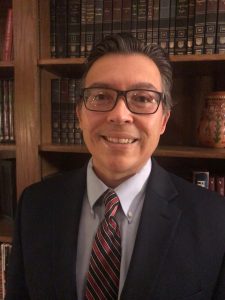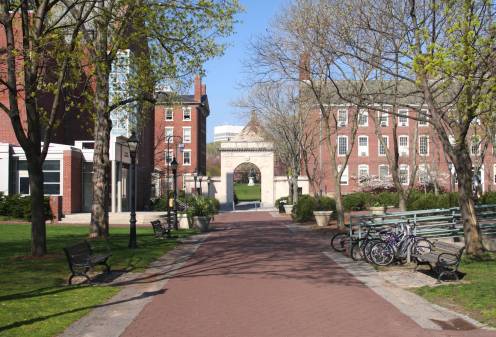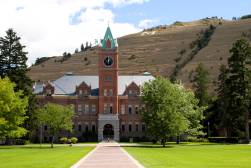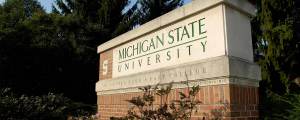To make an impact in higher ed: listen, learn, show you care, CIO says

Technology has become a central tool in higher education to improve students’ chances of academic success and prepare them to be lifelong learners. For David Sanchez, incoming chief information officer at Austin Peay State University in Clarksville, Tennessee, this potential impact has made higher education his passion.
Currently wrapping up his job as CIO at Midwestern State University Texas to move to Tennessee, Sanchez has spent the past 30 years working his way through different IT roles in higher education, from core IT service to department leadership and oversight.
And through his career, one thing Sanchez said he has kept top-of-mind is a famous quote by President Theodore Roosevelt: “Nobody cares how much you know, until they know how much you care.”

(Dr. David G. Sanchez / Austin Peay State University)
“What I always get out of that is that … regardless of of your work experience or education, if you can’t work with people, it’s hard to get things done,” Sanchez said.
In a recent interview, he talked about the rewards of working in higher education, the importance of listening and learning, emerging technology and maintaining a healthy work-life balance.
What drives and influences your work?
I guess I would say that the higher ed is a passion of mine. I think it’s where I want to be. I get a lot of fulfillment out of working in higher education and with students. I’m a believer in education and how you can impact students, make them lifelong learners, that type of stuff.
Also, building relationships is one of the things that is really important to my current work. You can be the smartest person out there, you can have the best ideas and have decades of experience in a particular field, but if you can’t build relationships with people or if you have a personality as such that you can’t team build, you can’t have empathy for other folks and see things from their perspective and build those relationships, it’s really hard to get things done.
You haven’t started at Austin Peay yet, so what are some impactful projects you’ve worked on at Midwestern State?
We have built some tools out that really were aimed at analytics and looking at data and doing some data analysis for our colleges and administrative units, like the registrar’s office. We took ten years of data and looked at things like enrollment patterns, student success, graduation, retention and student involvement and really looked at our course scheduling and our course offerings and our fill rates and we’re able to help our colleges and our registrars make some really good decisions as far as course offerings and number of sections. And so those tools I think help us build better decision making practices and campus infrastructure for the future.
What are your priorities as a CIO and how do you see them impacting the university?
The overall university priorities are IT priorities. So things like enrollment, things that are impacting the university, like legislation, state funds, the value and cost of higher education, diversity on campus and the free speech movement. We need to match what we’re doing within IT to what the university is doing to support the university and the things that they’re working on. I would definitely bring some of my priorities with me to Austin Peay, but not everything fits and not everything is transferable. So I’ll be doing a lot of learning and a lot of listening when I get there to help build my knowledge base. To be able to listen and understand and see the current priorities and if there’s any adjustments we need to make or there’s any big gaps, that’s my main goal.
What emerging technologies are you most excited about?
There’s a lot of really neat things that are sort of hitting right now. There’s a lot going on with immersive technologies and augmented and virtual realities and mixed realities. I see a lot of universities building those things into curriculum. There’s a lot of smart cities, smart homes, internet of things, wearable technology, a lot of stuff that is in the consumer area. It starts there sometimes and then it pushes into higher ed and so we try to keep a pulse on what’s going out there and see how they can impact teaching and learning and infrastructure in a university environment.
What I think about higher education in particular is that when you think back five or 10 years, there are jobs that we have now that we couldn’t have even imagined. There’s positions out there — telemedicine, applications developers for mobile technologies, social media managers and influencers, big data analytics — that five, 10 years ago really didn’t exist. And so what I think in higher education, sometimes what we’re doing is we’re trying to educate students for jobs that may not even exist right now, to solve problems that we don’t even know are problems right now. To me what’s great about our emerging technology or innovative solutions is that they keep us energized at the potential for the future, but they also allow us to invest in the students too so that they have the critical thinking skills and analytical skills to transition into those positions.
What is something that you do differently that makes you stand out as a CIO?
One is I think I bring a different perspective. I think it’s good to have different perspectives, whether it be from diverse people, people from different cultural backgrounds or different economic backgrounds. So I really, I think there’s a value in having a multitude of perspectives in decision making and building collaborative work teams.
And one of the things that I learned early on, which I’d like to think I employ, is to keep a good work/life balance. There’s always a problem to solve. There’s a project, the plan to work on. But I just seen a lot of folks not balance their work in their life and they burn out. You really have to take care of yourself. You have to be able to balance work and life. You have to have time for your hobbies and your passions and make it a priority to take care of yourself physically, emotionally, mentally, because I think that’s what allows you to be effective in your job. And hopefully I’ll be able to continue that and build that culture within the IT environment at Austin Peay.




